Her Team Supreme
On August 10th, 1993, Ruth Bader Ginsburg was sworn in as the 107th Supreme Court justice, making her the second woman and first Jewish female justice to sit on the distinguished bench. Since being sworn in, Justice Ginsburg has established herself in America’s history as a legend— and not just for her decisions in the courtroom.
Ginsburg is a graduate of Cornell University and Columbia Law School, where she tied for first in her class. Before she became a judge, she spent her career as an advocate for the advancement of women’s rights as a constitutional principle. She was a volunteer lawyer for the American Civil Liberties Union and a professor at Rutgers School of Law-Newark and Columbia Law School. In 1980, President Jimmy Carter appointed her to the U.S. Court of Appeals for the District of Columbia.

“The Notorious RBG,” as she is sometimes fondly called, celebrates her 85th birthday today and has spent her career fighting for the rights of women and other marginalized groups, even co-founding the ACLU’s Women’s Rights Project. In her 24 years on the Supreme Court, Ginsburg has lent her voice to countless crucial cases.
Servin’ Em Verbally
Find Ginsburg’s most major rulings in HeinOnline. In 1996, the Virginia Military Institute (VMI) was the country’s last remaining all-male public undergraduate college or university. The United States filed a suit against the school, arguing that the gender-exclusive admissions policy violated the Equal Protection Clause of the 14th Amendment of the Constitution. Once the case reached the Supreme Court, the state of Virginia argued that women were not suited for the rigorous training at VMI and that the female program created at the women’s-only liberal arts school Mary Baldwin University was equal to that of VMI’s. Ultimately the court disagreed, and Ginsburg wrote the majority opinion, which stated that gender equality is a constitutional right.
To search for a Supreme Court case in HeinOnline, navigate to the U.S. Supreme Court Library. Use the Advanced Search option under the stationary search bar. The second facet defaults to Case Name.
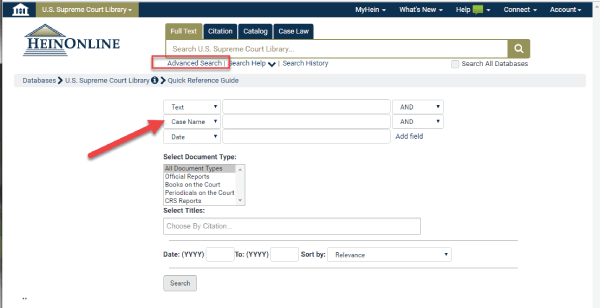
Using quotes around the case name, enter “United States v. Virginia” in the case name text box and access the full text of the case.
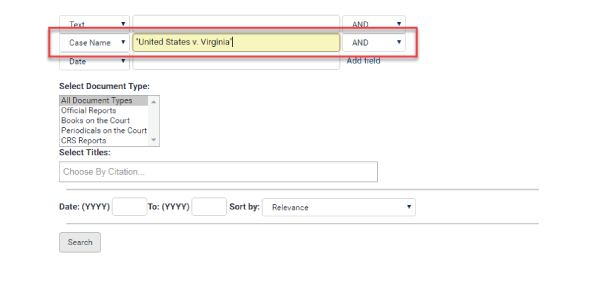
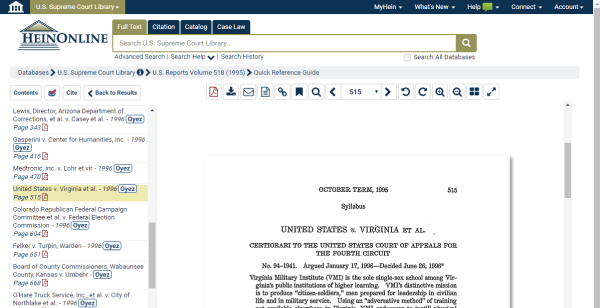
History of Supreme Court Nominations
This database features the complete print series Supreme Court of the U.S. Hearings and Reports on Successful and Unsuccessful Nominations of Supreme Court Justices by the Senate Judiciary Committee. The Browse by Justice option allows you to see relevant works related to that Justice, including links to articles, a bibliography of other works, and links to Scholarly Articles.
Browse by Justice
To browse by Justice, navigate to HeinOnline’s History of Supreme Court Nominations and select “Browse by Justice”.
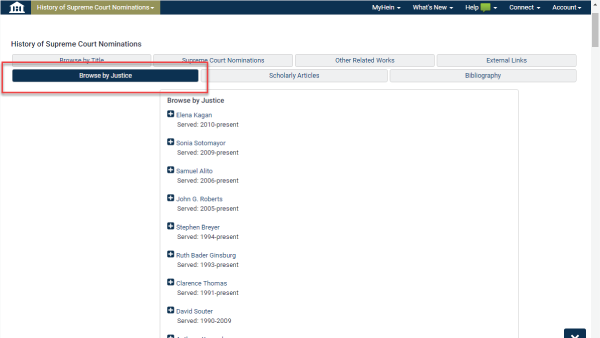
Click on a Justice’s name to expand the entry. Each entry includes a Biography, Commentaries & Other Relevant Sources, and Scholarly Articles Chosen by Our Editors.
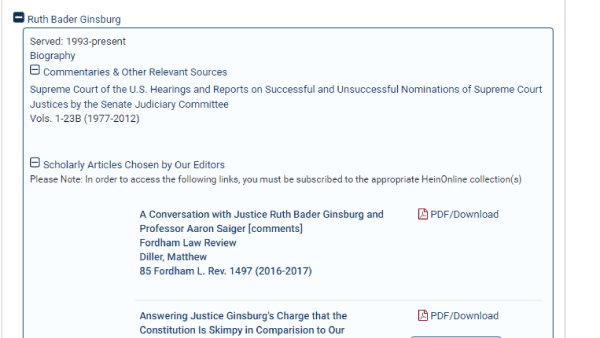
And If You Don’t Know, Now You Know
Want to find the most cited material by an author in HeinOnline? Navigate to HeinOnline’s Law Journal Library and use the Advanced Search underneath the stationary search bar.
Enter the author’s name in the Author/Creator box.
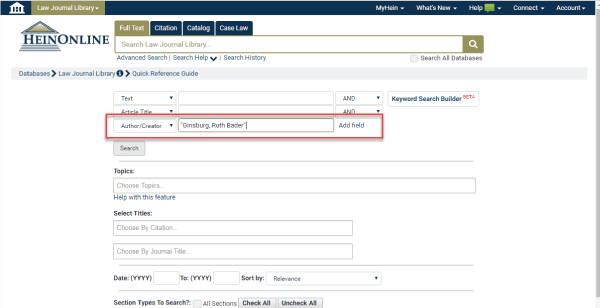
From the results, sort by Number of Times Cited by Articles to pull up the most cited material in HeinOnline.
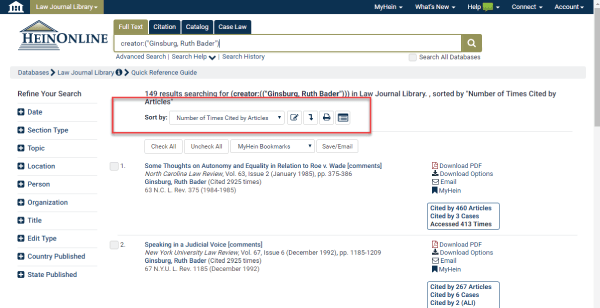
Ginsburg’s Top 3 Cited Articles in HeinOnline
Some Thoughts on Autonomy and Equality in Relation to Roe v. Wade [comments]
North Carolina Law Review, Vol. 63, Issue 2 (January 1985), pp. 375-386
Ginsburg, Ruth Bader (Cited 2619 times)
63 N.C. L. Rev. 375 (1984-1985)
Cited by 460 Articles
Speaking in a Judicial Voice [comments]
New York University Law Review, Vol. 67, Issue 6 (December 1992), pp. 1185-1209
Ginsburg, Ruth Bader (Cited 2925 Times)
67 N.Y.U. L. Rev. 1185 (December 1992)
Cited by 267 Articles
Remarks on Writing Separately [article]
Washington Law Review, Vol. 65, Issue 1 (January 1990), pp. 133-150
Ginsburg, Ruth Bader (Cited 2925 times)
65 Wash. L. Rev. 133 (1990)
Cited by 135 Articles
Women and the Law in HeinOnline
HeinOnline’s Women and the Law (Peggy) is a collection that brings together books, biographies and periodicals dedicated to the role of women in society and the law. This unique collection of materials provides a convenient platform for users to research the progression of women’s roles and rights in society over the past 200 years. Also included are more than 70 titles from Emory University Law School’s Feminism and Legal Theory Project which provide a platform to view the effect of law and culture on the female gender.
To the right of the screen inside the database, find a list of important woman in history with articles published in HeinOnline.
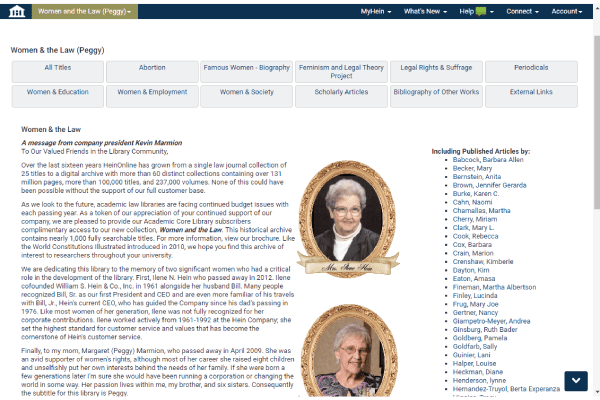
Search “gender equality” in the full text bar at the top of your screen inside of Women and the Law.
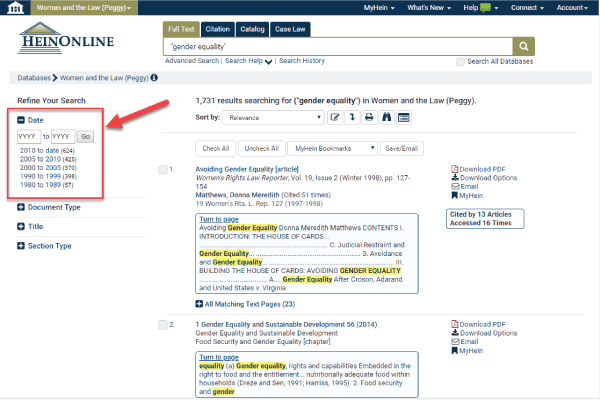
Use the date facet under Refine Your Search to narrow your results down from 2016 to 2018. This will pull up the most recent results on “gender equality” in HeinOnline’s Women and the Law Collection.
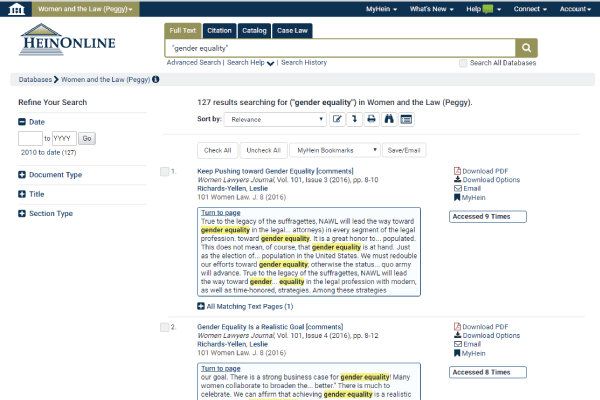
RBG’s Author Profile in HeinOnline
Author Profile Pages are an excellent way to showcase and promote an author’s scholarly work. This page automatically displays a list of an author’s articles and ScholarCheck statistics and can be enhanced to include a photo, biographical information, and links to the author’s website and social media accounts. Use email alerts to stay up to date with authors’ works.
To find an author profile page, use the Advanced Search option found on the Law Journal Library homepage. Enter the author’s name into the Author/Creator field and click the Search button.
The results show all the articles written by Ruth Bader Ginsburg. Users can also click on an author’s name from search results or from within a journal issue’s table of contents.
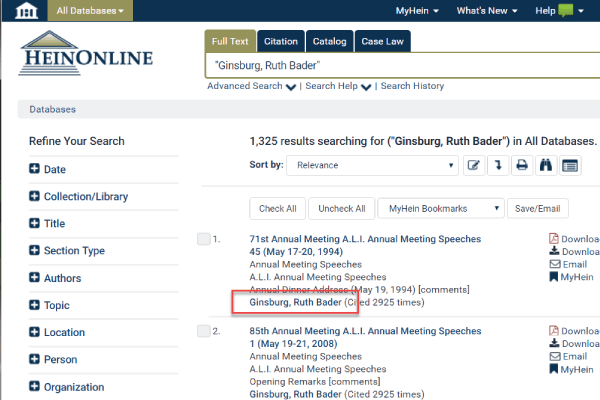
View Ginsburg’s profile, which includes her ScholarCheck rank, most cited material, times accessed in the past 12 months, and more in HeinOnline.
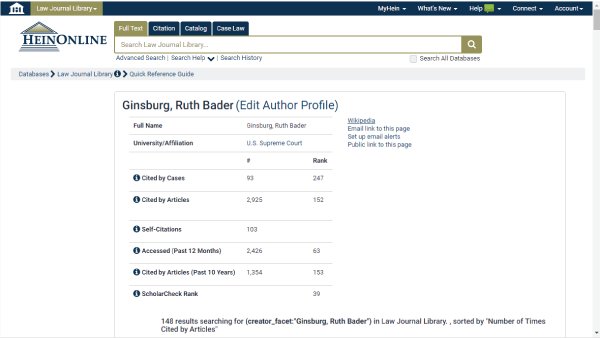
How to Enhance Author Profile Pages
If an author has articles in HeinOnline, a basic version of their page is automatically displayed. To enhance an author profile page, authors need to fill out this form. Authors have the option to include an email address, birth year, university/affiliation, title, ORCID ID#, biography, links to social media and website pages, and a photo. Once the form is submitted, a HeinOnline support representative creates the page and sends a link for an author to review the completed profile.
Check out this example of an enhanced Author Profile Page.
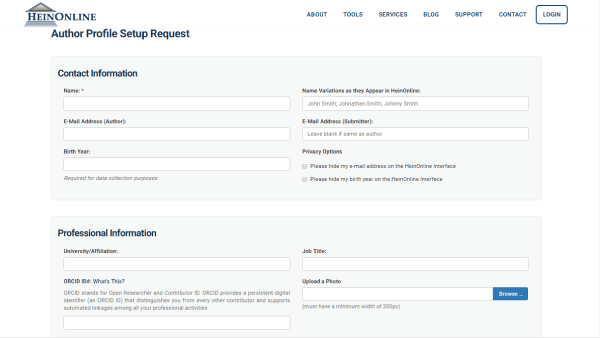
If a librarian would like to submit multiple profiles on behalf of faculty, please contact marketing@wshein.com and a representative will provide a CSV template.
Users can also edit an already enhanced profile by clicking on Edit Author Profile within the author profile page.
If you have any questions about Author Profile Pages, or need help navigating or searching in HeinOnline, contact our dedicated support team at (800) 277-6995, email us, or live chat with us!



